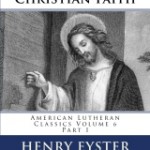
In an article published in National Review, “The Enduring Appeal of Creepy Christianity,” David French uses the news surrounding Judge Roy Moore to make some critical points about American Christianity.
The sub-title of his article — which definitely caught my attention — provocatively reads “the desire for certainty in an uncertain world yields terrible results.”
French states that Christians have two temptations rooted in the fear of men. One is the path that liberal Christians take: to “forsake Christian doctrine to seek the approval of a hostile culture.” The other path — which French distinguishes from the first by calling it “pernicious” — appeals to the “theologically orthodox: “the temptation to run toward a form of hyper-legalism as a firewall to protect your family from the sins of the world.”
He writes:
“Mothers and fathers are desperate for a way to guarantee that their children will grow up to love the Lord. They want to build high walls against sin, so they seek to create distinct communities that are free of the world’s filth and moral compromise.”
More:
“Theologically, [this temptation] fundamentally denies a very uncomfortable scriptural truth: that this side of heaven we can’t eliminate uncertainty or temptation. We “see through a glass darkly.” We simply don’t have all the answers — for raising children, for sustaining a successful marriage, for thriving in our careers, or for responding to sickness and adversity.
The scriptural response to this fundamental uncertainty is unsatisfying to some. Faith, hope, and love are vague concepts. The Bible doesn’t have a clear, specific prescription for every life challenge. But rather than seeking God prayerfully and with deep humility and reverence, we want answers, now. And thus we gravitate to those people who purport to offer more than the Bible.”
The thrust of French’s article is that there is much that is wrong with American evangelical Christianity, and that unless it “end[s] the cult of the Christian celebrity and the quest for certainty,” this world is “destined for ruin, and before it goes down, it will consume and damage the most vulnerable among us.”

I see much that is true in French’s article. His warnings about Christian celebrity are apt. As friend of mine says: “I am so done with celebrity pastors, so called “Christian” leaders, and pop-Evangelical Christian politicians.”
My friend goes on:
“I’ve made a couple of rules for myself. 1) Don’t trust any “Christian” leader who has a New York Times best seller. 2) Don’t attend conferences that attract more than 500 people in attendance or follow speakers that appear at that conference. And maybe 3) any “Christian” leader that appears regularly in the news.”
Perhaps a bit extreme, but he makes a great point.
In like fashion, even though I have not experienced them myself, I understand that there are communities of Christians who have a poor understanding of the law of God and who demand more from Christianity than it gives.

Another friend who read the article had some very challenging thoughts expanding on this:
“I think that the article is largely on target when it comes to the misguided quest of many Christians for certainty on worldly matters. God’s promises are absolutely sure, but they do not include children who will grow up to love the Lord, communities that are free of the world’s filth and moral compromise, successful marriages, thriving careers, proper responses to sickness and adversity, etc. For me, this is one of many manifestations of Western society’s embrace of technical rationality (techne) at the expense of practical judgment (phronesis); we want formulas and procedures with guaranteed outcomes for all aspects of life, but things just do not work that way within our fallen existence.
French quotes Ecclesiastes, which I consider to be the greatest philosophical treatise ever written, since it is the only divinely inspired one. My summary of its overall message is, “Your time is short, your understanding is shallow, and your control is shaky (at best). So fear God, because He rules all; keep His commandments, because He knows best; and enjoy His gifts, while you still can.”
There is much to take in here! Is it really true that the Lord does not promise us, e.g. successful marriages and children who will grow up to love the Lord? I hesitate to go so far in saying this, for it seems to me that passages like Proverbs 22:6 can definitely be taken as promises from the Lord. I know what my friend says above is meant to comfort, but such words make me very sad to. If God desires all persons to be saved, and I can’t be a conduit for His grace to efficaciously reach the flesh and blood who are under my own roof — especially when I beg Him for such mercy! — well, it is something I don’t even want to think about (….and I think, going to I Cor. 10:13 and John 16:12, that God knows what I as a father can bear!)

In any case, I think my friend’s words are wise words…(even as I supplement them!).
So David French is touching on some really good stuff.
At the same time, there is also something about the article that really made me uneasy. Maybe it’s this: when French says “[t]heologically, [this concern to protect one’s family] fundamentally denies a very uncomfortable scriptural truth,” I can’t not stop thinking about the following passage from 2 Corinthians (the end of chapter 6 and beginning of 7):
Do not be yoked together with unbelievers. For what do righteousness and wickedness have in common? Or what fellowship can light have with darkness? What harmony is there between Christ and Belial? Or what does a believer have in common with an unbeliever? What agreement is there between the temple of God and idols? For we are the temple of the living God. As God has said:
“I will live with them
and walk among them,
and I will be their God,
and they will be my people.”Therefore,
“Come out from them
and be separate,
says the Lord.
Touch no unclean thing,
and I will receive you.”And,
“I will be a Father to you,
and you will be my sons and daughters,
says the Lord Almighty.”Therefore, since we have these promises, dear friends, let us purify ourselves from everything that contaminates body and spirit, perfecting holiness out of reverence for God.”
It seems to me that a lot of persons outside the church might read something like that, and think, “Yep, the enduring appeal of creepy Christianity.”
That, however, would be terrible way to read the Apostle Paul. After all, who among us has not identified with what the church has said about the world — namely, that it is a “vale of tears”? And what if there is indeed — as the Apostle insists — true “higher ground” to be found? (see Colossians 3:1-4)

The overall message? Christ is the light of the world, and therefore the church, His bride, is the light of the world.
Even if the light doesn’t look so much like a City on the Hill these days as a candle – maybe even a flickering candle — in the darkness.
I take great comfort in the way Paul begins his letter:
“Praise be to the God and Father of our Lord Jesus Christ, the Father of compassion and the God of all comfort, who comforts us in all our troubles, so that we can comfort those in any trouble with the comfort we ourselves receive from God.”
Yes! And note — this is the kind of certainty we are meant to have. He has loved us with an everlasting love in His Son Jesus Christ.
Exulting in this certainty, I certainly will come out and be separate!
FIN
Image: David French pic: CC BY-SA 3.0 ; by Gage Skidmore.












